
From the Army to Wimbledon
| |||||||||||||||||||||||||||||||||||
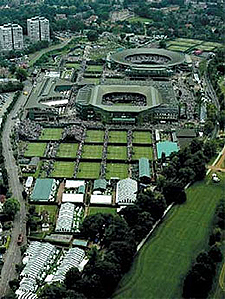 |
Wimbledon seemed like the entrance to a large stadium. |
How did I feel when I first set foot inside the hallowed grounds of the All England Lawn Tennis Club, better known as Wimbledon?
I suppose I had an "At last I'm here" inner excitement, but truly, as I was driven in that first day, it just seemed like an entrance to a large stadium. There was a big gate with an attendant on duty, and when we players arrived with the distinctive green and purple flag (the colors of Wimbledon) flying like a diplomat's banner from the hood of the car, the gate would swing open, with a couple of policemen standing by to make sure that none of the public swept in behind us.
There'd be two, three, or four of us in a car. The club dispatched chauffeur-driven cars all over London to wherever the players were staying. By calling the sacred phone number--Wimbledon double-two-double-four--we would request a pickup time, allowing ample time so that a car perhaps assigned to some other hotel could swing by ours and pick us up too.
We'd be let off about fifty feet inside the gate, up a slight hill, at the tournament office where we'd register. Just to the left was the men's locker room, which you needed a pass to enter. We would be given an I.D. card, a sheet of instructions with a list of social events for the tournament, and tickets for tea and lunch. And they gave you a badge that read "Player," which you wore around your neck on a string.
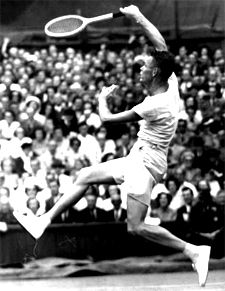 |
Jack Kramer: well-known and the second seed. |
Kramer's name was well known; he had been, at seventeen, the youngest member of the last Davis Cup challenge in 1939, and he was currently considered America's best player. Now twenty-five years old, he was seeded number two for this Wimbledon meet. Number one was Australia's Dinny Pails.
I, at age twenty-two, was unseeded because there were not enough data, due to my recent discharge from the army. My name meant nothing at the start of the tournament. I might as well have been "Mr. Anonymous." But I fooled 'em!
Never did I dream I would get as far as I did. I struggled a bit in the first round against a Brit named Deleford. But my cannonball serve carried me to a 6-4, 10 8, 6-2 win. I breezed through the second round versus another young Englishman, Ron Carter. It was a little disconcerting to notice his footwear. He wore socks over his shoes to prevent slipping on the wet grass.
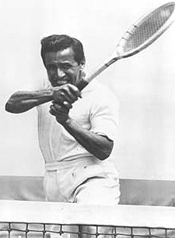 |
The press had already handed Segura the win. |
On the eve of the third round, I was returning to my hotel on the subway from Wimbledon. By chance, my seatmate turned out to be an American tennis writer. The conversation naturally revolved around potential winners. The columnist appraised Pancho Segura's chances highly, and went on to describe how Dinny Pails would probably defeat Pancho, the number-four seed, in the finals. I was noncommittal. When we reached our stop in London, the writer remarked, casually, "By the way, who do you play tomorrow?"
"Segura," I replied, with a wink and a smile. The writer's jaw dropped.
The next day, the morning of my match with Segura, Pancho, Jack and I were bantering in the car Wimbledon had sent for us. "Sneaky," Kramer said to Segura, "you're playing awfully well. But just for the hell of it, I'd like to throw a little money on Tom for a friendly bet. How about you giving three-to-one odds? That would be fair since you walloped him the last time you two played in the intercollegiates. What d'ya say?"
Segura agreed and said to me, "You can have my bet if you want it."
"I want it," I said.
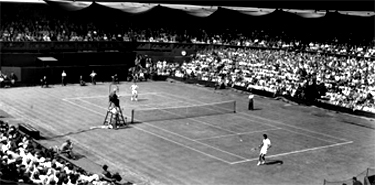 |
An awesome, even panicky feeling, the first time. |
So out we go, on Centre Court, because of Pancho's high seeding. It was, of course, my first experience there and the feeling was pretty damn awesome. Panicky even. You realize there's no escape. Not only that, but you have nothing to fiddle with to disguise your nervousness. Usually, you'd have your rackets to hold onto, but for Centre Court an attendant carries them so you have nothing. You might as well be naked.
I lost the first set, but then began playing quite well and the match turned around. Pancho's backhand was good, but I could hit forehands that drew him to the far side of the court, and it became one of my belier matches. I piled up a 5 love lead in one of the sets after that, won the match 4-6, 6-3, 6-3, 6-3, and duly collected my fifteen pounds.
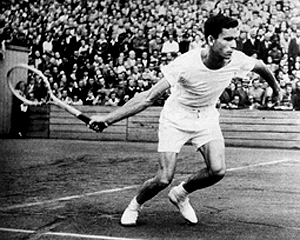 |
A 4 set win over Pancho made a bet pay off. |
It was the biggest upset of the tournament to that date, and the press had a field day. "Plain Tom Brown of the U.S.A. stole the show," said the New York Herald Tribune.
"Coast Kid Tops Segura at Wimbledon," the New York Daily News wrote.
"Segura's downfall came just at 4 p.m., the traditional 'tea hour' when Wimbledon fans flock to the lunch tables on the lawn, and it sent swarms of autograph seekers crowding around the hitherto virtually unknown Brown," reported the Associated Press.
Quoting another writer, "Everyone started asking questions at once. Who was this Tom Brown? What had he ever won? Where was he ranked in America? When someone said he wasn't ranked at all, a veteran English tennis observer shook his head and said, 'Not ranked at all, and he can play tennis like that? I take my hat off to the Americans."
Heady stuff, to be sure, but I was too experienced at how matches can go against you in tennis to be carried away by a feeling of euphoria.
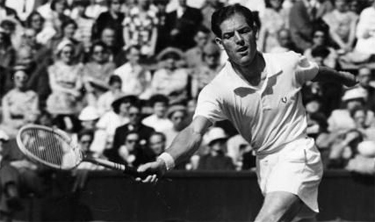 |
My fourth victim: English star Tony Mottram. |
I rewarded myself with a deep, hot soak in one of the bathtubs Wimbledon provides in the elite men's locker room, closest to Centre Court. It was a very civilized arrangement. Five or six huge tubs in individual glassed-in cubicles. You could soak there for hours, with no one pestering you to get out. To this day, tubs have been my favorite way of relaxing. I've never liked showers.
But back to the tennis. My fourth match was against Tony Mottram, Britain's best player, and we were told that Queen Mary and Prime Minister Clement Atlee would be watching from the royal box. I was summoned to the referee's office two hours ahead of time. They assigned a sort of palace guardian to me, as was protocol for any player set for Centre Court. Wimbledon takes no chances that you might not make it to the court on time. If you have to go to the can, he goes with you. Take a shower, and he's waiting outside the door. Stop at the tearoom for something to eat, he's by your side. And he keeps an intercom with him so they know where you are at all times.
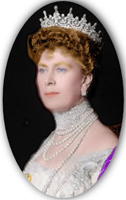 |
The Queen was in attendance. |
It was an awfully hot day, but I thought I should show proper respect to Britain's Queen Mother by wearing long flannel pants instead of displaying my skinny legs in shorts. Too late, I noticed that my opponent, the Brit, was comfortably garbed in shorts.Time to play, and Tony and I walked out together, preceded by a male escort.
About fifteen steps onto the court, the leader stopped. We did, too, and at his signal turned around, faced the royal box, and bowed to the queen. I'm told my bow wasn't too good, but practice makes perfect, they say.
Although perspiring heavily in my long pants, I routed Tony in straight sets and found myself in the quarterfinals, the only American left in the running. Budge Patty had been put out by Dinny Pails. Jack Kramer was also out of the singles. His racket hand suffering from a bad case of blisters, Jack had lost to Jaroslav Drobny.
In the fifth round, I didn't have much trouble with Feranja Puncec of Yugoslavia, but then I got my comeuppance in the semifinals versus Yvon Petra. The two-meter man, they called him. He was over six-seven, thirty years old, the current number-one player of France, and a prewar star of the French Davis Cup team. He had spent two years as a prisoner of war of the Germans, and he was one tough hombre. Yvon was seeded number five in the tournament.
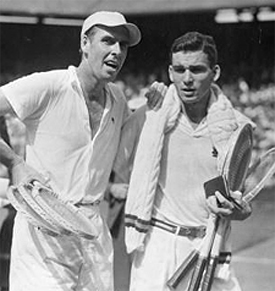 |
| A semi-final loss to French giant Yvon Petra. |
I was ahead two sets but let my guard down and lie swept back and took the next two. He was leading in the fifth set, 5-2. (Shades of the Bromwich-Falkenburg match, where this book began!) I managed to bring the decisive set up so we were even. At one point, I was within one game of victory, but in a cliffhanger-- 8-6, as I Recall--Yvon won the match and went on to take the championship.
"Brown Beaten By French Ace in Hard Scrap," the A.P. wrote. It sure was.
Meanwhile, my doubles play was going well. Very well. Doubles, historically, doesn't get nearly the publicity that singles does. But Kramer and I, the number-two seeds, won the men's doubles against Australians Dinny Pails and Geoff Brown, who'd been seeded first.
Jack had just twelve words for me before we began our match.
"Okay, kid. Just get your first serve in, and get in quick." Our slashing net game bamboozled them-- 6-4, 6-4, 6-2.
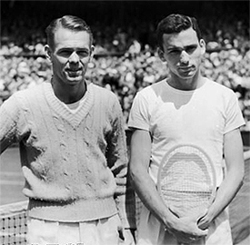 |
Tom Brown and Jack Kramer: Wimby doubles champs. |
With Louise Brough, I captured the mixed doubles from Geoff
Brown and Dodo Bundy. Ironic, although I didn't realize it at the time, that Dodo was the daughter of my father's boyhood tennis pal, Tom Bundy.
Louise had just completed a tough three-set women's finals before being called out for the mixed. "Are you ready, Miss Brough?" I heard them summon her. "Just wait till I put my shorts on!" she hollered back.
Louise was a joy to play with. We were just a year apart in age. We had met when we were fifteen and sixteen, playing the northwest circuit. But we'd never played together before that Wimbledon tournament. We found we didn't have to ask each other to do certain things. We never had an argument or disagreement. She would say something, or I would, and it would be answered by a nod. None of this "Yours!", "Mine!", "I've got it!" kind of crap.
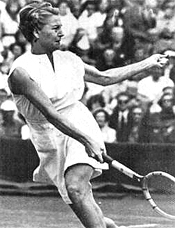 |
Louise Brough: my mixed doubles partner and a joy to play with. |
She knew the "twilight zone"--balls that she might be able to put away but which her male partner, having a greater margin of speed and strength, would have a better percentage of doing. I always knew by her body language whether she was going to step in and take it or stand aside. We orchestrated together very smoothly.
Two more nice memories of that glory year at Wimbledon. The American Ambassador, Averill Harriman, held a party in honor of the American players. "How do you find the food here?" he asked me.
"Well, sir, I surely miss having fresh eggs in the morning," I answered. (Food shortages still existed in those postwar times.) Next morning at the hotel, the clerk at the reception desk hailed me. "Oh, Mr. Brown, we have something for you." It was a little Easter-like basket with a card from the ambassador that read, "Hope you enjoy your breakfast." The basket contained one beautiful big brown egg.
 |
Averill Harriman: ambassador, spectator, egg donor. |
At the same party, I chatted with an attractive girl of about my age. She turned out to be Prime Minister Atlee's daughter. She told me about her stint in the war as an ambulance driver, and I told her about my ambitions to become a lawyer. She asked me what I'd seen of London. I told her I hadn't had a chance to do any sightseeing yet.
"How would you like a personal tour of London?" she asked me.
"Gee, that would be great," I replied, and the next morning (yes, the same morning I'd received the ambassador's egg) she picked me up at the Rembrandt at the wheel of her own car.
"I thought, since you were going to law school, that you would like to see our House of Lords," she smiled. And that was our first stop. There was this giant guard at the door wearing the traditional tall bearskin hat, looking very fierce. She nodded to him; didn't have to say a word. He nodded back, bowed, and swung the door open for us.
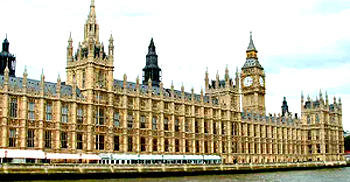 |
The House of Lords: on my personal tour of London. |
Quite a thrill for this San Francisco boy, because the House of Lords is not open to the general public. I wrote home and told my parents about it. They were amazed that such a royal event could have happened to me.
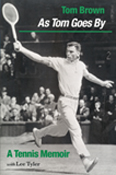 |
As Tom Goes By |
Tom Brown |
Want to read the inside story of life in the golden days of big time amateur tennis? A native San Franciscan who grew up at Golden Gate Park, Tom Brown went on to win at Wimbledon in both the men's and mixed doubles. |
||
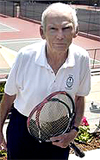 |
A native San Franciscan who grew up playing at legendary Golden Gate Park, Tom Brown won the first post war Wimbledon doubles title in 1946 with Jack Kramer. He won the mixed doubles that year as well. Later, he was a singles runner up to Big Jake at both Wimbledon and the U.S. Nationals at Forrest Hills. A successful San Francisco attorney, Tom continued his amazing competitive career at events around the world, with a longevity matched by virtually no other seniors player, including numerous number one world rankings. |
|
Contact Tennisplayer directly: jyandell@tennisplayer.net
Copyright Tennisplayer 2005. All Rights Reserved.

